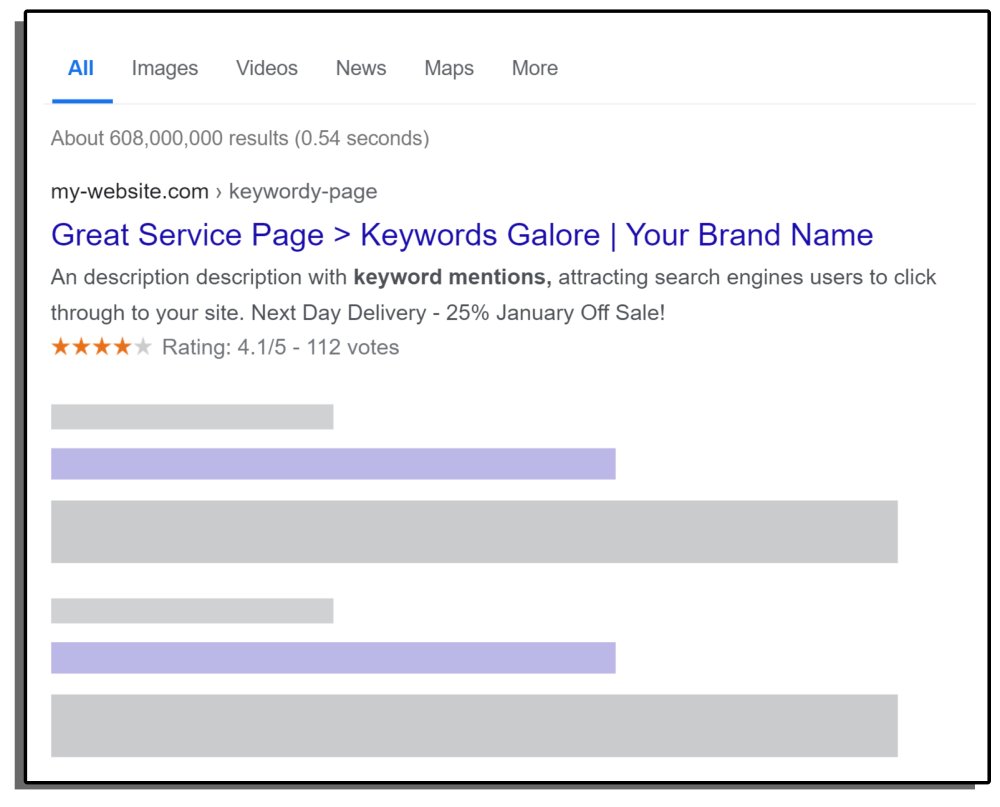On-page SEO: content optimisation

I can perform on-page SEO (or content optimisation) by placing keywords, which will improve rankings and drive additional organic traffic. However, we can take this further. I can improve the audience quality and website conversion rates by ensuring keywords are relevant and meet the search intent of your audience, and target different SERP features (e.g., rich snippets, images, videos, local pack, ‘people also ask’), gaining even more traffic from diverse sources.
Here is a typical user journey from the SERPs to a website with the tasks that will drive this:
1. Rank in relevant SERPs
- Perform keyword research beforehand and map the right keywords to the correct pages – so a users’ search intent matches the page they land on (this helps keep people on your site and get enquiries or sales)
- Optimise primary, secondary and tertiary keywords into the right elements in your content (title and meta tags, headings, body content)
2. Drive more diverse traffic
- Write and optimise your title and meta description tags in a way that encourages people to click on your result over your competitors (SERP optimisation – improving the wording, keyword mentions, using special offers and unique selling points)
- Getting found as rich results (position zero answers to questions, ‘people also asked’ results on Google) structuring your content in specific ways and using features like structured data
- Getting found for image and video results as well as text (using image and video SEO)
3. Engage and convert more
- Ensuring your content reads well, is in line with your brand guidelines, provides an answer to what people searched for, and engages them enough to result in a conversion (enquiry, sale, social share)
When performing content optimisation, some of these tasks get overlooked. However, due to my years of experience in trying to drive more qualified traffic to websites, I am focussed on improving and optimising your content for every stage of the user journey.
Content audit and marketing strategy
I am able to optimise your service and product pages with keywords without needing an audit. However, performing ongoing SEO with link building will require more than just keyword rich content. We will need to engage and encourage users and external content vendors (website’s, publications, forums) to share and link to it.
I will perform a content audit on your product and/or service pages, and supporting content (blogs, news, FAQs, guides) both on your site and hosted externally (on publications, blogs, industry websites and so on). This includes text and rich media content, as we can multiply our search traffic by appearing in image and video search results too, even utilising audio where relevant.
As a one-off or part of a holistic SEO campaign, this content audit will determine how effective your content is in driving rankings, traffic, engagement, conversions, backlinks, and returning visits – or brand advocates. I will list quick wins, where we can improve existing content, and long-term wins where we create engaging reactive and evergreen content. This can also inform a content marketing strategy, where we agree on what type of content to produce and outreach to external websites to build and earn backlinks.
Content audit process
-
 Gathering information on your tone of voice (if relevant), business KPIs, direct and indirect competition, target audience and their personas
Gathering information on your tone of voice (if relevant), business KPIs, direct and indirect competition, target audience and their personas
-
 Auditing your content, your competitors’ and the industry, listing opportunities prioritised by their impact to your bottom line
Auditing your content, your competitors’ and the industry, listing opportunities prioritised by their impact to your bottom line
-
 Creating a list supporting content ideas (e.g., blogs, articles, FAQs, case studies and more) mapped on an editorial calendar
Creating a list supporting content ideas (e.g., blogs, articles, FAQs, case studies and more) mapped on an editorial calendar
-
 Presenting a task list for improving existing content and creating new content, agreeing on how to implement this between stakeholders
Presenting a task list for improving existing content and creating new content, agreeing on how to implement this between stakeholders
A content audit document will form a big part of an ongoing SEO and content marketing strategy, acting as an action-list that we can change to react to industry events and topic trends on a monthly basis. I will also report on the performance of your optimised content in monthly SEO reports – giving you a transparent indication of your return on investment.
What is on-page or on-site SEO?
On-page (or on-site SEO) involves optimising your content (text and rich media) for topics and keywords. Also writing it in an engaging way, so search engines rank your content prominently and drive additional organic traffic, engagement, and conversions to your site.
In addition to keyword placement, good on-page SEO also considers:
- SERP optimisation (improving CTR from search engines)
- Content structure (affecting whether you appear for certain types of rich snippets)
- Content quality and matching search intents (improving on-site engagement and conversions)
